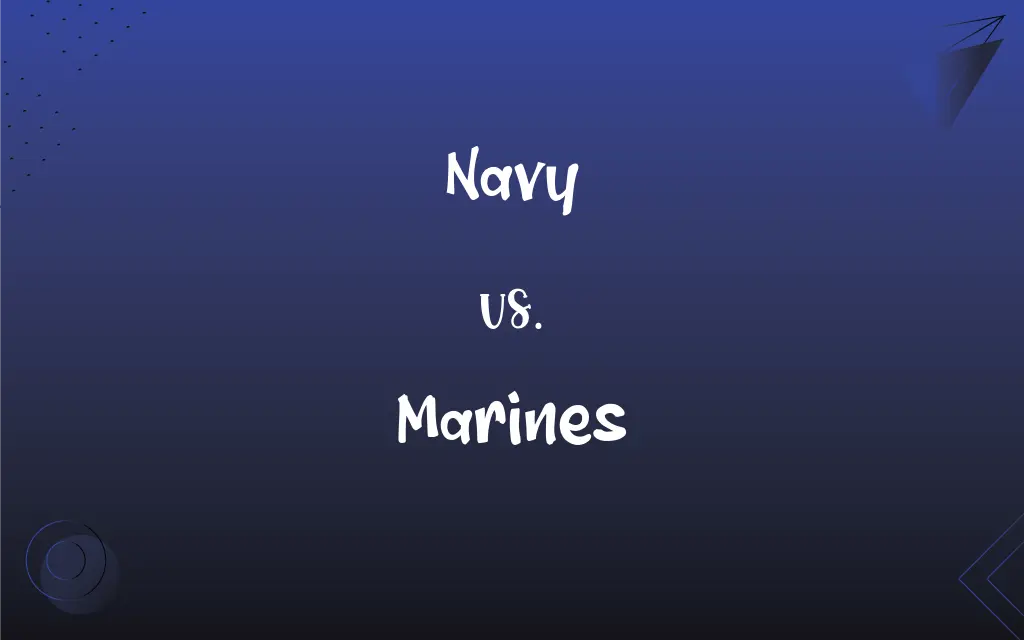Navy vs. Marines: What's the Difference?
Edited by Harlon Moss || By Janet White || Published on November 28, 2023
Navy refers to a branch of a nation's armed forces trained for military service at sea. Marines refers to a military force trained to operate on both land and sea, often specializing in amphibious operations.

Key Differences
The navy is a branch of the military focused on naval warfare, operating primarily at sea. It includes ships, submarines, and aircraft carriers, and plays a crucial role in defending a country's maritime borders and interests. Marines, on the other hand, are a specialized branch of the military trained for operations on both land and sea. They are often involved in amphibious assaults and are known for their rapid response capabilities.
The navy is also responsible for securing sea trade routes and conducting maritime operations. Meanwhile, marines are trained to deploy quickly and operate in a variety of environments, including on ships, in coastal areas, and on land.
Navies typically have a broader range of responsibilities, including anti-piracy, search and rescue, and humanitarian missions. They maintain a variety of vessels like destroyers, frigates, and submarines, and are also involved in naval blockades and sea control operations. While, marines are known for their versatility and ability to operate in challenging terrains. They are often the first to be deployed in conflict zones, especially for beach landings and securing strategic coastal positions. Marines are also trained for ground combat and can operate as a rapid reaction force.
In terms of organization, the navy often has a larger and more diverse set of personnel and equipment, focusing on sustained naval operations. The navy's role extends to power projection, deterrence, and sea control, with a significant emphasis on maintaining a country's naval supremacy. However, marines are usually a smaller, more agile force, with a focus on expeditionary warfare and rapid deployment. They are often part of a country's navy but operate with a distinct command structure, ethos, and specialized training tailored to amphibious and expeditionary warfare.
Comparison Chart
Primary Role
Naval warfare and operations at sea.
Amphibious warfare and rapid response on land and sea.
ADVERTISEMENT
Operation Area
Primarily at sea.
Both land and sea, with a focus on coastal areas.
Types of Missions
Anti-piracy, sea control, humanitarian missions.
Beach landings, securing strategic positions, rapid response.
Equipment
Ships, submarines, aircraft carriers.
Amphibious assault vehicles, infantry equipment.
Focus
Sustained naval operations, sea trade protection.
Quick deployment, versatile operations in various terrains.
Navy and Marines Definitions
Navy
A country's armed forces specialized in warfare at sea.
The navy deployed its fleet to secure the maritime borders.
ADVERTISEMENT
Marines
Specialized forces for rapid deployment and amphibious warfare.
The marines quickly secured the coastal area.
Navy
The branch of the military operating ships and submarines.
The navy's aircraft carrier played a key role in the operation.
Marines
Elite troops specializing in expeditionary and combat operations.
The marines played a crucial role in the rescue mission.
Navy
Military service focused on controlling and protecting sea routes.
The navy's presence ensured safe passage for cargo ships.
Marines
Military troops trained for land and sea operations.
The marines were deployed for an amphibious assault.
Navy
A naval force responsible for maritime defense and security.
The navy conducted anti-piracy operations in the region.
Marines
A branch of the military adept in both naval and ground combat.
The marines conducted joint training with the army.
Navy
Armed forces trained for sea-based military operations.
The navy participated in joint exercises with allied countries.
Marines
Armed forces known for versatility in challenging terrains.
The marines navigated the rugged landscape efficiently.
Navy
All of a nation's warships.
Marines
Of or relating to the sea
Marine exploration.
Navy
Often Navy A nation's entire military organization for sea warfare and defense, including vessels, personnel, and shore establishments.
Marines
Native to, inhabiting, or formed by the sea
Marine animals.
Navy
A group of ships; a fleet.
Marines
Relating to a system of oceanic habitats coextensive with the continental shelf, ranging from deep water to unprotected coastlines and characterized along its landward edge by exposure to wave action and tidal currents and by the absence of trees, shrubs, or emergent vegetation.
FAQs
What is the main function of the navy?
Naval warfare and protection of maritime interests.
Are marines part of the navy?
Often, but they have distinct roles and training.
What types of ships does the navy use?
Various, including destroyers, frigates, and aircraft carriers.
Does the navy operate submarines?
Yes, submarines are a key part of the navy's fleet.
Do marines operate independently of the navy?
They can, but they're also integrated with naval operations.
What distinguishes marines?
Specialization in amphibious assaults and rapid deployment.
Does the navy engage in anti-piracy operations?
Yes, protecting sea routes from piracy is a key task.
What is the primary focus of marines?
Rapid response and versatility in amphibious warfare.
Are marines involved in direct ground combat?
Yes, they are trained for various combat scenarios.
How are marines trained differently than army troops?
With a focus on amphibious operations and rapid deployment.
What makes marines effective for quick missions?
Their specialized training and rapid response capabilities.
Do marines have their own air support?
They often have integrated air-ground support units.
Is the navy involved in humanitarian missions?
Yes, the navy often conducts search and rescue and humanitarian aid.
What's the role of a navy in national defense?
Securing maritime borders and deterring naval threats.
Is the navy's role changing with technological advancements?
Yes, evolving technologies are shaping naval strategies and capabilities.
Do navies participate in international exercises?
Yes, they often engage in joint exercises with allied navies.
Can the navy operate in riverine environments?
Some navies have specialized units for riverine operations.
Can marines be deployed on land?
Yes, they are trained for both land and sea operations.
How does the navy contribute to a country's power projection?
By maintaining a presence in international waters and key regions.
What are the career paths available in the marines?
Various, from combat roles to technical and support positions.
About Author
Written by
Janet WhiteJanet White has been an esteemed writer and blogger for Difference Wiki. Holding a Master's degree in Science and Medical Journalism from the prestigious Boston University, she has consistently demonstrated her expertise and passion for her field. When she's not immersed in her work, Janet relishes her time exercising, delving into a good book, and cherishing moments with friends and family.
Edited by
Harlon MossHarlon is a seasoned quality moderator and accomplished content writer for Difference Wiki. An alumnus of the prestigious University of California, he earned his degree in Computer Science. Leveraging his academic background, Harlon brings a meticulous and informed perspective to his work, ensuring content accuracy and excellence.






































































